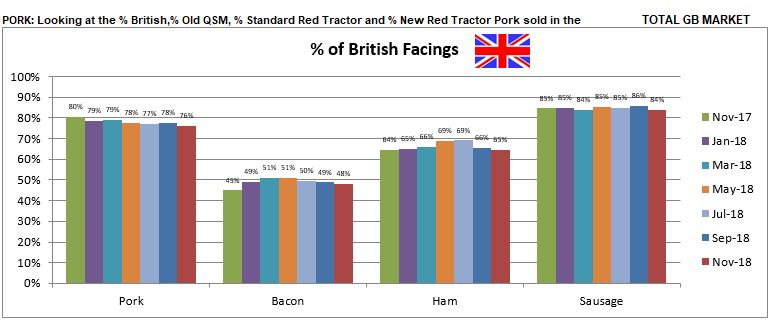The latest Porkwatch figures have shown a disappointing decline in the proportion of British pork on display in leading British retailers.
The November survey showed that across the 11 retailers surveyed, 76% of fresh pork was British, 2% down on the September survey and 5% down on a year ago.
Aldi, Budgens, the Co-op, Lidl, Marks & Spencer, Morrisons, Sainsbury’s and Waitrose all stocked 100% British fresh pork. In contrast, Asda’s proportion of British was just 41%, while the Tesco figure of 54% was down from 61% in September and above 70% a year ago. Iceland, relatively new to the survey, stocked 61% British fresh pork, the AHDB survey showed.
There was better news on bacon, with the overall figure of 48% fractionally down on September, but up from 45% a year ago. The biggest driver in this appeared to be Asda, which at 29% British, was well up on a year ago, albeit from a very low base. Aldi also posted a big increase in British bacon.
The overall proportion of British ham on display, at 65%, was in line with September and a year ago, while the figure for sausage of 84% was slightly down on September and year-on-year.
Waitrose, Marks & Spencer and the Co-op continued to lead the way in terms of the proportion of British pork products on display in their stores, the AHDB survey showed.
You can see the full November survey results here
NPA chief executive Zoe Davies said: “As ever, we thank those retailers who are supporting British pork producers with their sourcing policies.
“The drop in the proportion of British pork is disappointing, but not altogether surprising given the differential between UK and EU prices and, in particular, the availability of cheap Belgian product on the back of the African swine fever outbreak. But this short-termism is damaging to the British pig sector, particularly at a time when the future is already uncertain enough
“We know, however, that consumers are increasingly looking for high quality, traceable Red Tractor British pork produced to the highest standards – and we expect to see retailers’ sourcing policies reflecting that in 2019.”




